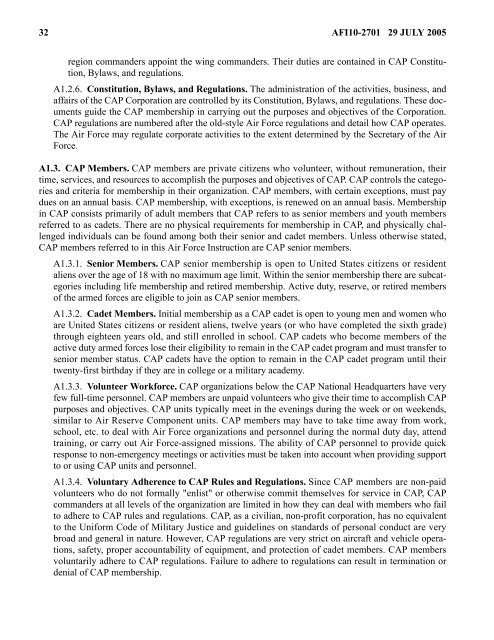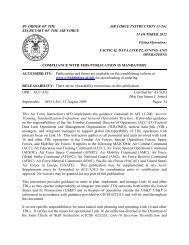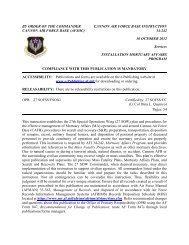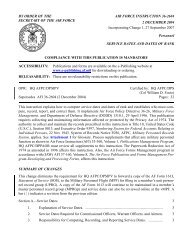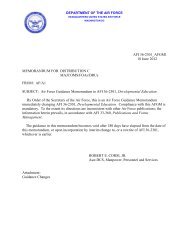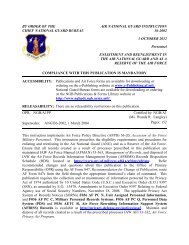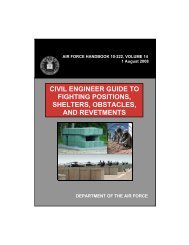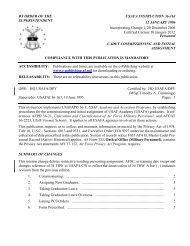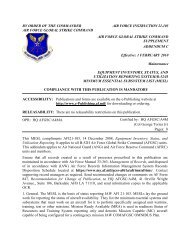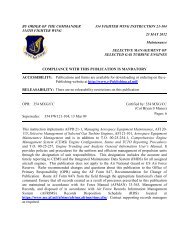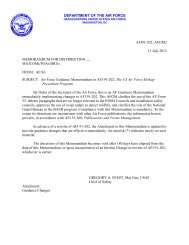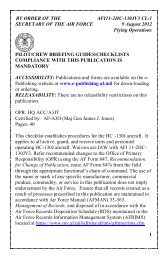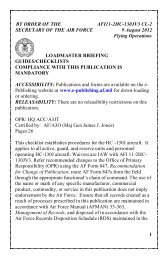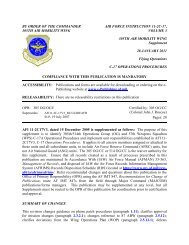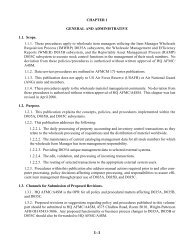AFI 10-2701 - Air Force E-Publishing
AFI 10-2701 - Air Force E-Publishing
AFI 10-2701 - Air Force E-Publishing
You also want an ePaper? Increase the reach of your titles
YUMPU automatically turns print PDFs into web optimized ePapers that Google loves.
32 <strong>AFI</strong><strong>10</strong>-<strong>2701</strong> 29 JULY 2005<br />
region commanders appoint the wing commanders. Their duties are contained in CAP Constitution,<br />
Bylaws, and regulations.<br />
A1.2.6. Constitution, Bylaws, and Regulations. The administration of the activities, business, and<br />
affairs of the CAP Corporation are controlled by its Constitution, Bylaws, and regulations. These documents<br />
guide the CAP membership in carrying out the purposes and objectives of the Corporation.<br />
CAP regulations are numbered after the old-style <strong>Air</strong> <strong>Force</strong> regulations and detail how CAP operates.<br />
The <strong>Air</strong> <strong>Force</strong> may regulate corporate activities to the extent determined by the Secretary of the <strong>Air</strong><br />
<strong>Force</strong>.<br />
A1.3. CAP Members. CAP members are private citizens who volunteer, without remuneration, their<br />
time, services, and resources to accomplish the purposes and objectives of CAP. CAP controls the categories<br />
and criteria for membership in their organization. CAP members, with certain exceptions, must pay<br />
dues on an annual basis. CAP membership, with exceptions, is renewed on an annual basis. Membership<br />
in CAP consists primarily of adult members that CAP refers to as senior members and youth members<br />
referred to as cadets. There are no physical requirements for membership in CAP, and physically challenged<br />
individuals can be found among both their senior and cadet members. Unless otherwise stated,<br />
CAP members referred to in this <strong>Air</strong> <strong>Force</strong> Instruction are CAP senior members.<br />
A1.3.1. Senior Members. CAP senior membership is open to United States citizens or resident<br />
aliens over the age of 18 with no maximum age limit. Within the senior membership there are subcategories<br />
including life membership and retired membership. Active duty, reserve, or retired members<br />
of the armed forces are eligible to join as CAP senior members.<br />
A1.3.2. Cadet Members. Initial membership as a CAP cadet is open to young men and women who<br />
are United States citizens or resident aliens, twelve years (or who have completed the sixth grade)<br />
through eighteen years old, and still enrolled in school. CAP cadets who become members of the<br />
active duty armed forces lose their eligibility to remain in the CAP cadet program and must transfer to<br />
senior member status. CAP cadets have the option to remain in the CAP cadet program until their<br />
twenty-first birthday if they are in college or a military academy.<br />
A1.3.3. Volunteer Workforce. CAP organizations below the CAP National Headquarters have very<br />
few full-time personnel. CAP members are unpaid volunteers who give their time to accomplish CAP<br />
purposes and objectives. CAP units typically meet in the evenings during the week or on weekends,<br />
similar to <strong>Air</strong> Reserve Component units. CAP members may have to take time away from work,<br />
school, etc. to deal with <strong>Air</strong> <strong>Force</strong> organizations and personnel during the normal duty day, attend<br />
training, or carry out <strong>Air</strong> <strong>Force</strong>-assigned missions. The ability of CAP personnel to provide quick<br />
response to non-emergency meetings or activities must be taken into account when providing support<br />
to or using CAP units and personnel.<br />
A1.3.4. Voluntary Adherence to CAP Rules and Regulations. Since CAP members are non-paid<br />
volunteers who do not formally "enlist" or otherwise commit themselves for service in CAP, CAP<br />
commanders at all levels of the organization are limited in how they can deal with members who fail<br />
to adhere to CAP rules and regulations. CAP, as a civilian, non-profit corporation, has no equivalent<br />
to the Uniform Code of Military Justice and guidelines on standards of personal conduct are very<br />
broad and general in nature. However, CAP regulations are very strict on aircraft and vehicle operations,<br />
safety, proper accountability of equipment, and protection of cadet members. CAP members<br />
voluntarily adhere to CAP regulations. Failure to adhere to regulations can result in termination or<br />
denial of CAP membership.


